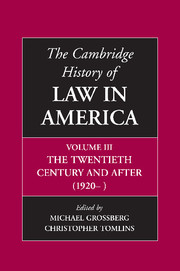Book contents
- Frontmatter
- 1 Law and the State, 1920–2000: Institutional Growth and Structural Change
- 2 Legal Theory And Legal Education, 1920–2000
- 3 The American Legal Profession, 1870–2000
- 4 The Courts, Federalism, and The Federal Constitution, 1920–2000
- 5 The Litigation Revolution
- 6 Criminal Justice in the United States
- 7 Law and Medicine
- 8 The Great Depression and the New Deal
- 9 Labor’s Welfare State: Defining Workers, Constructing Citizens
- 10 Poverty law and income Support: From the Progressive Era to the War on Welfare
- 11 The Rights Revolution in the Twentieth Century
- 12 Race and Rights
- 13 Heterosexuality as a Legal Regime
- 14 Law and the Environment
- 15 Agriculture and the State, 1789–2000
- 16 Law and Economic Change During the Short Twentieth Century
- 17 The Corporate Economy: Ideologies of Regulation and Antitrust, 1920–2000
- 18 Law and Commercial Popular Culture in the Twentieth-Century United States
- 19 Making Law, Making War, Making America
- 20 Law, Lawyers, and Empire
- Bibliographic Essays
- Notes on Contributors
- Index
16 - Law and Economic Change During the Short Twentieth Century
Published online by Cambridge University Press: 28 November 2008
- Frontmatter
- 1 Law and the State, 1920–2000: Institutional Growth and Structural Change
- 2 Legal Theory And Legal Education, 1920–2000
- 3 The American Legal Profession, 1870–2000
- 4 The Courts, Federalism, and The Federal Constitution, 1920–2000
- 5 The Litigation Revolution
- 6 Criminal Justice in the United States
- 7 Law and Medicine
- 8 The Great Depression and the New Deal
- 9 Labor’s Welfare State: Defining Workers, Constructing Citizens
- 10 Poverty law and income Support: From the Progressive Era to the War on Welfare
- 11 The Rights Revolution in the Twentieth Century
- 12 Race and Rights
- 13 Heterosexuality as a Legal Regime
- 14 Law and the Environment
- 15 Agriculture and the State, 1789–2000
- 16 Law and Economic Change During the Short Twentieth Century
- 17 The Corporate Economy: Ideologies of Regulation and Antitrust, 1920–2000
- 18 Law and Commercial Popular Culture in the Twentieth-Century United States
- 19 Making Law, Making War, Making America
- 20 Law, Lawyers, and Empire
- Bibliographic Essays
- Notes on Contributors
- Index
Summary
At the beginning of the short twentieth century heavy, blue-collar industry dominated the physical economy. Railroads were the dominant form of continental transportation; the ocean liner (for passengers) and the freighter (for cargo) the only available form of interconational transportation. Radio was the new, wonderful, transformative industry, and national consumer brands were beginning their domination of the grocery store’s growing cornucopia.
At the end of the century, service industries dominate the economy. Were there any notion of the physical economy, it would probably focus on multiple kinds of imported consumer goods. Continental transportation of goods is dominated by interstate trucking; that of passengers, by airplanes. The ocean liner has changed into a floating hotel called the cruise ship; intercontinental passengers travel by air and goods in large steel boxes on truly ungainly looking, specially designed container ships. The Internet qualifies as the new, wonderful, transformative industry, and produce from Latin America has begun to dominate the grocery store’s still expanding bounty.
Looked at in a more schematic way, the story is the same. During years that witnessed an amazing growth in the administrative apparatus of all levels of government, there simultaneously occurred three large-scale changes, three of those developments that somehow define eras. First, the middle class expanded to include a portion of the working class as part of a dominating consumer culture. Second, the imperial Northeastern manufacturing economy, the colonial Southern agricultural economy, and the colonial Western agricultural and natural resources economy all declined while simultaneously a lighter manufacturing economy in the South and West grew, as did a service economy throughout the country.
- Type
- Chapter
- Information
- The Cambridge History of Law in America , pp. 563 - 612Publisher: Cambridge University PressPrint publication year: 2008
- 1
- Cited by

